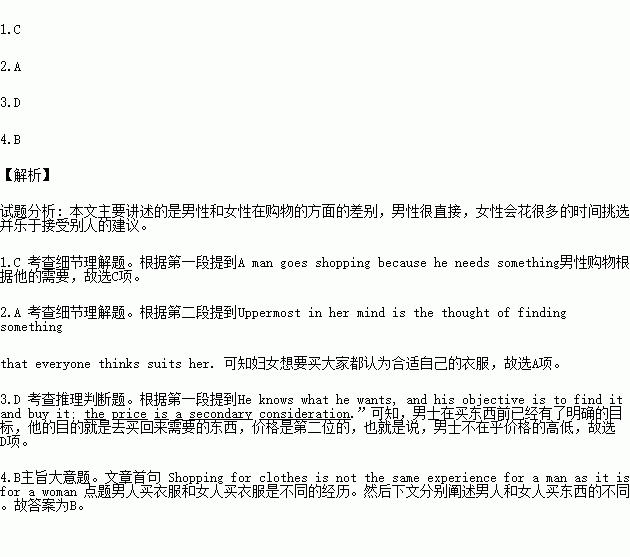题目内容
Shopping for clothes is not the same experience for a man as it is for a woman. A man goes shopping because he needs something. His purpose is settled and decided in advance. He knows what he wants, and his objective is to find it and buy it; the price is a secondary consideration. All men simply walk into a shop and ask the assistant for what they want. If the shop has it in stock, the salesman promptly produces it, and the business of trying it on goes forward at once. All being well, the deal can be and often is completed in less than five minutes, with hardly any chat and to everyone's satisfaction. For a man, slight problems may begin when the shop does not have what he wants, or does not have exactly what he wants. In that case the salesman, as the name implies, tries to sell the customer something else, he offers the nearest he can to the article required. No good salesman brings out such a substitute without least consideration; he does so with skill and polish(完美): “I know this jacket is not the style you want, sir, but would you like to try it for size. It happens to be the color you mentioned." Few men have patience with this treatment, and the usual response is: “This is the right color and may be the right size but I should be wasting my time and yours by trying it on.
Now how does a woman go about buying clothes? In almost every respect she does so in the opposite way. Her shopping is not often based on need. She has never fully made up her mind what she wants, and she is only “having a look round". She is always open to persuasion: indeed she sets great store by what the saleswoman tells her, even by what companions tell her. She will try on any number of things. Uppermost in her mind is the thought of finding something that everyone thinks suits her. Contrary to a lot of jokes, most women have an excellent sense of value when they buy clothes. They are always on the lookout for the unexpected bargain. Faced with a roomful of dresses, a woman may easily spend an hour going from one rail to another, to and fro often retracing her steps, before selecting the dresses she wants to try on. It is a tiresome process, but apparently an enjoyable one. Most dress shops provide chairs for the waiting husbands.
1.According to the passage, a man’s shopping is based on _______.
A. his money B. his hobbies
C. his need D. his friends
2.Why does a lady welcome suggestions from anyone while buying a dress?
A. Because she wants to buy a dress that every one thinks suits her.
B. Because she doesn’t know how to buy a dress.
C. Because she doesn’t know whether to buy it or not.
D. Because she wants to show herself off in public.
3.Which of the following statements is TRUE according to the passage?
A. Most men have patience with trying it on while buying a jacket.
B. Most women have a poor sense of value when buying a dress.
C. A woman’s shopping is based on her need.
D. A man doesn’t pay much attention to the price of the clothes he wants to buy.
4.The passage mainly talks about the ______ between men shoppers and women shoppers for clothes.
A. similarities B. differences
C. varieties D. intentions
 阅读快车系列答案
阅读快车系列答案
